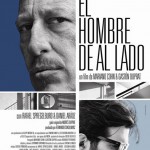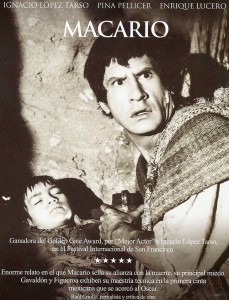Blog del Instituto Cervantes de Dublín
Torre Martello
Cine | Film Screening: Tango
Today is the last session of the Argentinian Film Series with the screening of the critically aclaimed film Tango by Carlos Saura. You can enjoy it at 6pm at Café Literario.
Set in Buenos Aires, the film tells the story of director Mario Suarez’s quest to make the ultimate tango film. Lonely after his wife has left him, Mario must find the themes that will hold the film together, while simultaneously permitting his musicians and dancers the freedom of expression that is necessary to satisfy the tango-hungry Argentine audience. Things become complicated when Mario falls in love with Elena, a beautiful and talented young dancer who is the girlfriend of the powerful and dangerous Angelo Larroca, an investor in the picture.
Hoy leemos con | Today we are reading with: Harry Clifton, Omar Pérez, Lorna Shaughnessy y Diego Valverde Villena
La segunda actividad del Festival ISLA es un estupendo recital poético que podrás disfrutar el 2 de noviembre a partir de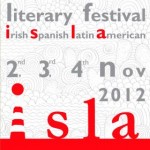 las 17:15 en el Café Literario.
las 17:15 en el Café Literario.
Estos cuatro poetas han seleccionado algunos de sus mejores poemas a los que pondrán su voz en este recital en versión original. Presenta: Bill Richardson (NUI Galway).
Harry Clifton (Dublín, 1952) ha vivido una parte importante de su vida fuera de Irlanda (Nigueria, Extremo Oriente, Italia…) De su estancia en Italia publicó sus memorias en prosa On the Spine of Italy. En 2004 regresó a Irlanda. Entre sus colecciones de poemas se encuentran The Desert Route: Selected Poems 1973-1988 y Secular Eden: Paris Notebooks 1994-2004. También es autor de una colección de ficción, Berkeley’s Telephone and Other Fictions(2000). Clifton fue nombrado Ireland Chair of Poetry en el 2010. Ha recibido también el premio de poesía Patrick Kavanagh y dos premios Arts Council Bursaries de literatura. Sus obras han sido traducidas a varias lenguas europeas.
Lorna Shaughnessy (Belfast, Irlanda del Norte, 1961) es poeta, traductora y profesora de Lengua Española en la Universidad Nacional de Irlanda, Galway. Ha publicado dos libros de poemas, Torching the Brown River (2009) y Witness Trees (2011) y dos traducciones de poesía contemporánea mexicana,Mother Tongue: Selected Poems by Pura López Colomé y If We Have Lost our Oldest Tales, de María Baranda (2006). Su traducción de The Disappearance of Snow de Manuel Rivas fue publicada en 2012.
Omar Pérez (La Habana, Cuba, 1964) es poeta, ensayista y traductor, además de periodista, crítico de teatro y cine, editor y locutor de radio. Su última publicación es la colección de ensayos El corazón mediterráneo (2011). Como poeta ha publicado Algo de lo sagrado (1996), ¿Oíste hablar del gato de pelea? (1999), Canciones y Letanías (2002) y Lingua Franca (2009). En inglés ha publicado Something of the Sacred (2007), traducción de Algo de lo sagrado, a cargo de Kristin Dykstra y Did you hear about the fighting cat? (2010).
Diego Valverde Villena (Lima, Perú, 1967). Poeta español y peruano, de ascendencia boliviana. En 2011 publicó su libro de poemas Un segundo de vacilación. Ha traducido obras de Conan Doyle, Kipling, John Donne, Ezra Pound, Valery Larbaud, Nuno Júdice, E.T.A. Hoffmann y Paul Celan, entre otros. Sus poemas aparecen en numerosas antologías y han sido traducidos a varios idiomas, entre ellos al irlandés. Entre sus principales obras de poesía se encuentran: El difícil ejercicio del olvido(1997), No olvides mi rostro (2001) y El espejo que lleva mi nombre escrito (2006).
The second event of the ISLA Festival will be an outstanding poetry reading on November 2nd at 5.15pm at Café Literario.
These four poets will be reading a selection of some of their best poems in their original language in this poetry reading. Introduced by Bill Richardson (NUI Galway)
Harry Clifton (Dublin, 1952) has spent great part of his life outside of Ireland (Nigeria, Far East, Italy…). He documented the time spent in Italy in his prose memoir On the Spine of Italy. In 2004, he returned to Ireland. His collections of poems include The Desert Route: Selected Poems 1973-1988 and Secular Eden: Paris Notebooks 1994-2004. He is also the author of a collection of fiction, Berkeley’s Telephone and Other Fictions (2000). He was appointed as the Ireland Chair of Poetry in 2010. His other honors include the Patrick Kavanagh Poetry Award and two Arts Council Bursaries in Literature. His work has been translated into several European languages.
Omar Pérez (Havana, Cuba, 1964) is a poet, essayist and translator, as well as a journalist, theatre and film critic, editor and radio announcer. His last publication was the collection of essays El corazón mediterráneo (2011). As a poet he publishedAlgo de lo sagrado (1996), ¿Oíste hablar del gato de pelea? (1999), Canciones y Letanías (2002) andLingua Franca (2009). In English he publishedSomething of the Sacred (2007), the translation ofAlgo de lo Sagrado by Kristin Dykstra, and Did You Hear About The Fighting Cat? (2010).
Lorna Shaughnessy (Belfast, Northern Ireland, 1961) is a poet, translator and lecturer in Spanish in the National University of Ireland, Galway. She has published two collections of poems, Torching the Brown River (2009) and Witness Trees (2011) and two translations of contemporary Mexican poetry,Mother Tongue: Selected Poems by Pura López Colomé and If We Have Lost our Oldest Tales by María Baranda, (2006). Her translation of Manuel Rivas’ The Disappearance of Snow, was published in 2012.
Diego Valverde Villena (Lima, Peru, 1967) is a Spanish and Peruvian poet of Bolivian descent. In 2011 he published his book of poems Un segundo de vacilación. He has translated, among others, works of Conan Doyle, Joseph Rudyard Kipling, John Donne, Ezra Pound, Valery Larbaud, Nuno Júdice, E.T.A. Hoffmann and Paul Celan. His poems appear in many compilations and have been translated into several languages, including Irish. His most famous works in poetry are El difícil ejercicio del olvido (1997), No olvides mi rostro (2001) and El espejo que lleva mi nombre escrito (2006).
Film screening | Cine: Las acacias
Todavía estás a tiempo de disfrutar del estupendo ciclo del cine argentino más actual. La película de hoy es Las acacias y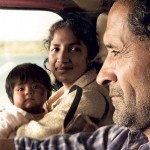 se proyectará a las seis en el Café Literario.
se proyectará a las seis en el Café Literario.
La ruta que une Asunción de Paraguay con Buenos Aires. Un encargo: camionero debe llevar a una mujer desconocida. La mujer no llega sola, trae una niña en brazos. 1.500 kilómetros de viaje por delante.
La ópera prima de Pablo Giorgelli (…) presenta un conflicto menor que progresa a medida que los minutos transcurren, para terminar convirtiendo una historia mínima en una lección del más puro cine (en Escribiendo Cine).
Película ganadora de la Cámara de Oro en el último Festival de Cannes y premiada en San Sebastián, Londres, Biarritz y Bratislava, entre otros.
You can still enjoy the best of Argentinian cinema thanks to the film series that we show in October. The film that will be shown today is Las Acacias. The screening will be at 6pm at Cafe Literario.
Rubén is a lonely truck driver who has been covering for years the motorway from Asunción del Paraguay to Buenos Aires, carrying wood. However, today’s journey will be different. This morning, in a motorway stop near Asunción, Jacinta shows up an hour later to begin a journey by track which is going to take her to Buenos Aires. What’s more, Rubén finds out at that very moment that little Anahí, who’s 8 months old, will travel with them- It is not the best beginning. As kilometres go by, the relationship between Rubén and Jacinta will grow. They will slowly meet and sip into each other’s soul. None of them talks much about their lives. None asks much either. It’s a few word journey but it is not a silent one.
Awarded the Golden Camera at the Cannes Film Festival and other prizes in San Sebastián, London, Biarritz and Bratislava, just to mention a few.
Mesa redonda: Literatura fantástica y poesía. De Cortázar a Beckett, pasando por Borges | Round Table: Poetry and fantastic literature. From Cortázar to Beckett, including Borges along the way
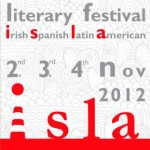 Abrimos el festival ISLA con esta mesa redonda en la que los invitados Elia Barceló, Harry Clifton y María Negroni hablarán sobre literatura fantástica y poesía, sus influencias y mucho más con Jean-Philippe Imbert (DCU). No te puedes perder esta cita el próximo día 2 de noviembre a las 16:00 horas en el Café Literario.
Abrimos el festival ISLA con esta mesa redonda en la que los invitados Elia Barceló, Harry Clifton y María Negroni hablarán sobre literatura fantástica y poesía, sus influencias y mucho más con Jean-Philippe Imbert (DCU). No te puedes perder esta cita el próximo día 2 de noviembre a las 16:00 horas en el Café Literario.
Elia Barceló (Alicante, España, 1957) ha publicado novelas policíacas, históricas, de ciencia ficción y género fantástico para adultos, así como novelas para jóvenes y ensayos. Ha recibido el Premio Gabriel 2007, galardón reservado para las más importantes personalidades del género fantástico en España. Ha sido traducida al francés, italiano, alemán, catalán, inglés, griego, húngaro, holandés, danés, noruego, sueco, croata, portugués, euskera, checo, ruso y esperanto. Sus novelas traducidas al inglés hasta la fecha son: Corazón de tango (2007), traducida al inglés como Heart of Tango (2010) y The Goldsmith’s Secret (2011), traducción de El secreto del orfebre (2003).
Harry Clifton (Dublín, 1952) ha vivido una parte importante de su vida fuera de Irlanda (Nigeria, Extremo Oriente, Italia…). De su estancia en Italia publicó sus memorias en prosa On the Spine of Italy. En 2004 regresó a Irlanda. Entre sus colecciones de poemas se encuentran The Desert Route: Selected Poems 1973-1988 y Secular Eden: Paris Notebooks 1994-2004. También es autor de una colección de ficción, Berkeley’s Telephone and Other Fictions(2000). Clifton fue nombrado Ireland Chair of Poetry en 2010. Ha recibido también el premio de poesía Patrick Kavanagh y dos premios Arts Council Bursaries de literatura. Sus obras han sido traducidas a varias lenguas europeas.
María Negroni (Rosario, Argentina, 1951) es poeta, ensayista y novelista. Como poeta, ha publicado, entre otros libros: Islandia, El viaje de la noche, Arte y Fuga, La Boca del Infierno y Cantar la nada. También ha publicado varios libros de ensayos y dos novelas. Ha traducido, entre otros, a Emily Dickinson, Louise Labé, Valentine Penrose, Georges Bataille, H.D., Charles Simic y Bernard Noël, y la antología de mujeres poetas norteamericanas La pasión del exilio(2007). Su libro Islandia recibió el premio del PEN American Center en Nueva York al mejor libro de poesía en traducción del año (2001) y Galería Fantástica recibió el Premio Internacional de Ensayo de Siglo XXI (México). Su obra ha sido traducida al inglés, francés, sueco e italiano.
The ISLA festival will kick off with this round table where guests Elia Barceló, Harry Clifton and María Negroni will discuss poetry and fantastic literature, its influences and much more with Jean-Philippe Imbert (DCU). This event will be held the 2nd of November at 4pm at our Café Literario.
Elia Barceló (Alicante, Spain, 1957) has published crime, historical, science fiction and fantastic novels for adults, as well as young adult books and essays. In 2007 she received the Gabriel Award, a prize for the most important personalities in the fantastic genre in Spain. Her work has been translated into French, Italian, German, Catalan, English, Greek, Hungarian, Dutch, Danish, Norwegian, Swedish, Croatian, Portuguese, Basque, Czech, Russian and Esperanto. Her novels translated into English are: Corazón de tango (2007), translated into English under the nameHeart of Tango (2010) and The Goldsmith’s Secret(2011), a translation of El secreto del orfebre (2003).
Harry Clifton (Dublin, 1952) has spent great part of his life outside of Ireland (Nigeria, Far East, Italy…). He documented the time spent in Italy in his prose memoir On the Spine of Italy. In 2004, he returned to Ireland. His collections of poems include The Desert Route: Selected Poems 1973-1988 and Secular Eden: Paris Notebooks 1994-2004. He is also the author of a collection of fiction, Berkeley’s Telephone and Other Fictions (2000). He was appointed as the Ireland Chair of Poetry in 2010. His other honors include the Patrick Kavanagh Poetry Award and two Arts Council Bursaries in Literature. His work has been translated into several European languages.
María Negroni (Rosario, Argentina, 1951) is a poet, essayist and novelist. She has published numerous poetry books: Islandia, El viaje de la noche, Arte y Fuga, La Boca del infierno and Cantar la nada, to mention just a few. She is also author of several essays and two novels. She has translated several poets: Emily Dickinson, Louise Labé, Valentine Penrose, Georges Bataille, H.D., Charles Simic and Bernard Noël, as well as the anthology of 20th century North American women poets La Pasión del Exilio (2007). Her book Islandia received the 2001 PEN American Center Award for best book of poetry in translation. She was awarded the 21st Century International Essay Prize (Mexico) for her bookGalería Fantástica. Her work has been translated into English, French, Swedish and Italian.
Recital literario: Poesía útil con Ángel Guinda | Poetry reading: Useful Poetry with Ángel Guinda
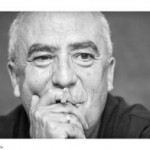 El Instituto Cervantes de Dublín y la editorial Olifante tienen el placer de presentarles hoy a las 18:00 en el Café Literario este recital poético del autor español Ángel Guinda, quién mostrará una proyección de videoclips sobre su poética (Arquitextura) y Manifiestos (Poesía útil, Antimanifiesto, Manifiesto No) además de videopoemas. A los audiovisuales les seguirá una lectura comentada por el propio autor y un coloquio. Presenta y conversa con el autor, Jennifer Wood (NUI Maynooth)
El Instituto Cervantes de Dublín y la editorial Olifante tienen el placer de presentarles hoy a las 18:00 en el Café Literario este recital poético del autor español Ángel Guinda, quién mostrará una proyección de videoclips sobre su poética (Arquitextura) y Manifiestos (Poesía útil, Antimanifiesto, Manifiesto No) además de videopoemas. A los audiovisuales les seguirá una lectura comentada por el propio autor y un coloquio. Presenta y conversa con el autor, Jennifer Wood (NUI Maynooth)
Ángel Guinda (Zaragoza, 26 de agosto de 1948) es un escritor español conocido sobre todo por su poesía, aunque su obra abarca géneros muy variados: artículos en periódicos y revistas, ensayos y traducciones. Fundó la Colección Puyal de libros de poesía en 1977 y la revista Malvís en 1988. Ha publicado más de una veintena de libros y es coautor de la letra del Himno de Aragón. En 2010 fue galardonado con el Premio de las Letras Aragonesas.
Ángel Guinda dará una charla en la Universidad de Maynooth el martes 23 de octubre a las 17:00 h.
Instituto Cervantes Dublin and Olifante Publishing House are delighted to present this poetry recital today at 6pm at Café Literario by Spanish author Ángel Guinda. He will screen a series of video clips about his poetry (“Arquitextura”) and Manifestos (“Poesía útil”, “Antimanifiesto”, “Manifiesto No”) as well as video poems. The videos will be followed by a recital with comments by the author and a Q&A session. Introuced by Jennifer Wood (NUI Maytnooth)
Ángel Guinda (Zaragoza, August 26th, 1948) is a Spanish writer known mainly for his poetry, although his work extends to various genres: newspaper and magazine articles, essays and translations. He founded the Colección Puyal of poetry books in 1977 and the Malvís magazine in 1988. He has published over twenty books and is the co-author of the lyrics to the Aragón anthem. In 2010 he received the award Premio de Letras Aragonesas.
Ángel Guinda will offer a lecture at the University of Maynooth in October 23rd, at 5 pm.
Cine / Film screening: El mural
La segunda sesión del ciclo de cine argentino llega hoy a las seis al Café Literario con la proyección de la película El mural.
La trama desarrolla su acción en los años treinta, cuando llega al país David Alfaro Siqueiros. El film relata las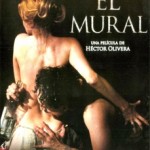 distintas circunstancias que llevaron al pintor a realizar el famoso mural en la quinta Los Granados, propiedad de Natalio Botana, con la colaboración de los pintores argentinos Lino Enea Spilimbergo, Antonio Berni y Juan Carlos Castagnino y el uruguayo Enrique Lázaro; más las complicadas y entrecruzadas relaciones entabladas entre los personajes protagonistas de la historia.
distintas circunstancias que llevaron al pintor a realizar el famoso mural en la quinta Los Granados, propiedad de Natalio Botana, con la colaboración de los pintores argentinos Lino Enea Spilimbergo, Antonio Berni y Juan Carlos Castagnino y el uruguayo Enrique Lázaro; más las complicadas y entrecruzadas relaciones entabladas entre los personajes protagonistas de la historia.
Película ganadora de cinco Premios Sur 2010: Mejor Fotografía, Mejor Montaje, Mejor Dirección artística, Mejor Diseño de vestuario y Mejor Maquillaje y Caracterización.
The second session of the Argentinian film series will be held today at 6pm at Cafe Literario with the screening of El mural.
The plot takes place in the 30s, when David Alfaro Siqueiros arrived to the country. The film relates the several circumstances leading the artist to paint the famous mural in Los Granados, the country estate of Natalio Botana, with the collaboration of Argentinean painters Lino Enea Spilimbergo, Antonio Berni and Juan Carlos Castagnino, and the Uruguayan Enrique Lázaro. The story reveals the complicated criss-cross relations among the main characters.
Awarded five Premios Sur 2010: Best Photography, Best Editing, Best Art Direction, Best Costume Design, Best Makeup and Portrayal.
Cine / Film screening: El hombre de al lado / The man next door
Comenzamos un nuevo ciclo de cine con algunas de las mejores películas de la cinematografía argentina de los últimos años. Te esperamos hoy a las seis en el Café Literario.
El hombre de al lado narra un conflicto entre vecinos que parece no tener fin. Una simple pared medianera puede dividir dos mundos, dos maneras de vestir, de comer, de vivir. De un lado Leonardo (Rafael Spregelburd), fino y prestigioso diseñador que vive en una casa realizada por Le Corbusier. Del otro lado Víctor (Daniel Aráoz), vendedor de autos usados, vulgar, rústico y avasallador. Víctor decide hacer una ventana para tener más luz, y ahí empieza el problema: cada uno toma conciencia de la existencia del otro.
Película seleccionada para los Premios Goya como Mejor película extranjera de habla hispana.
We start a new cinema series today with the screening of some of the best and most recent Argentinian films. The first film will be shown today at 6pm at Café Literario.
A small incident over two neighbours common wall sparks a conflict which affects the intimacy of the view over the chimney; the protagonist sparks a conflict and with paranoiac obsession destroys everyday life.
In the Argentine black comedy The Man Next Door privacy becomes an issue for the main character, Leonardo, whose home happens to be the Curutchet house inLa Plata, Argentina, which was designed by Le Corbusier in 1949.
Living in a design icon certainly has its drawbacks. It’s bad enough that Leonardo has to deal with pushy tourists who constantly ask for tours, but then his neighbor Victor attempts — without Leonardo’s permission — to build a window in a dividing wall between the two houses, to get more sunlight. The window, to Leonardo’s horror, would allow the rather boorish Victor to see all the intimate details of Leonardo’s family’s life.
Goya Awards nomination for best Spanish Language Foreign Film.
Concierto / Concert: Sheila Ríos
 La mejor música mexicana llega hoy al Café Literario a las 19:00h de la mano de la cantante Sheila Ríos con el espectáculo “Regresando a sus raíces”.
La mejor música mexicana llega hoy al Café Literario a las 19:00h de la mano de la cantante Sheila Ríos con el espectáculo “Regresando a sus raíces”.
Sheila Ríos (Guadalajara, Jalisco, México). De madre irlandesa y padre mexicano, Sheila Ríos cuenta con una trayectoria artística que lejos de ser larga, está llena de experiencia y reconocimiento. Su historia siempre ha estado envuelta en música, marcada por la herencia artística y nostálgica de Irlanda junto al romanticismo de las canciones mexicanas.
La música la ha llevado a muchas partes del mundo, con diferentes agrupaciones y como solista; destacando su participación con la banda mexicana de rock más reconocida y famosa a nivel internacional, “Maná”, con quienes ha compartido más que una profesión… una vida.
Ahora se encuentra trabajando en un nuevo material donde interpreta sus propias composiciones. El más reciente, “Trozos de Luna”, fue producido por Fher, el líder y catante de “Maná”, junto con Fernando Quintana, quien en esta ocasión la acompaña en esta visita a sus raíces, en la bella Irlanda.
Reservas: reservas.dublin@cervantes.es
Don´t miss today the best of Mexican music with the singer Sheila Ríos at 7pm at the Café Literario. She will be performing her show “Going back to the roots”.
Sheila Ríos (Guadalajara, Jalisco, Mexico). With an Irish mother and a Mexican father, Sheila Ríos has an artistic trajectory that is far from being long and still full of experience and recognition. Her story has always been connected with music, marked by the artistic and nostalgic heritage and the romanticism of Mexican songs.
Her music has taken her to many parts of the world, both as solo artist and with different groups, of which “Maná” especially stands out, the most recognized and famous Mexican rock band, with whom she has shared more than a profession…a life.
Now she is working with new material where she interprets her own compositions. The most recent one, “Trozos de Luna”, was produced by Fher, the leader and singer of “Maná”, along with Fernando Quintana, who in this occasion is accompanying her during the visit to her roots in beautiful Ireland.
Cine / Film screening: Yo bailé con Don Porfirio
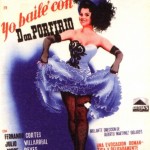 Finalizamos hoy el ciclo “Grandes figuras del cine mexicano” con la proyección de “Yo bailé con Don Porfirio” en el Café Literario a las seis.
Finalizamos hoy el ciclo “Grandes figuras del cine mexicano” con la proyección de “Yo bailé con Don Porfirio” en el Café Literario a las seis.
México a principios de siglo. Don Severo, su esposa y su hija Rosa llegan a la capital donde él tiene otra hija, Violeta, quien aspira a ser vedette. Ambas son idénticas y ese parecido provocará varios equívocos. Don Severo se encuentra con Porfirio, su amigo astrólogo, quien le presenta al coronel don Evaristo, el cual va a dar una fiesta para don Porfirio. El teatro Principal, la sociedad afrancesada y los duelos dan vida a esta comedia nostálgica.
Cine / Film screening: Ahí está el detalle
La comedia llega hoy al Café Literario con “Ahí está el detalle”. La película se proyectará a las seis dentro del ciclo “Grandes figuras del cine mexicano”.
En la película el novio de la sirvienta de un rico empresario tiene que entrar en la casa para matar un perro rabioso. La confusión entre el perro Bobby y un gángster del mismo nombre desencadena una serie de enredos entre un celoso marido, su nerviosa esposa, una pícara criada, una esposa abandonada con ocho hijos y el singular Cantinflas.
Comedy is coming today to our Cafe Literario with the film “Ahí está el detalle”. The screening is at 6pm as part of the film series “Great Figures of Mexican Cinema”. Cantinflas is the boyfriend of the servant of a rich industrial man, gets into the house in order to kill a mad dog. Suddenly this man appears so the servant tells him that Cantinflas is his wife’s brother, who had been lost for years. The rich man then remembers that his father in law’s testament could only be paid when all brothers get together, so treats Cantinflas, a real bum, as a king.
Film screening | Cine: Modisto de señoras
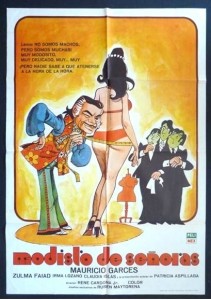 Una comedia ligera llega hoy a nuestro Café Literario a las 18:00. En Modisto de señoras, el sastre D’Maurice simula ser afeminado para encajar en el mundo de la alta costura y tomar ventaja de dicha apariencia para conquistar a todas sus clientas; burlándose así de todos los esposos de las mismas quienes confiadamente creen dejar a sus mujeres en buenas manos. La película forma parte del ciclo Grandes figuras del cine mexicano.
Una comedia ligera llega hoy a nuestro Café Literario a las 18:00. En Modisto de señoras, el sastre D’Maurice simula ser afeminado para encajar en el mundo de la alta costura y tomar ventaja de dicha apariencia para conquistar a todas sus clientas; burlándose así de todos los esposos de las mismas quienes confiadamente creen dejar a sus mujeres en buenas manos. La película forma parte del ciclo Grandes figuras del cine mexicano.
A funny film comes today to the Café Literario today at 6pm. In Modisto de señoras, a the susccessful fashion designer D’Maurice seduces married women while he pretends to be gay in order to avoid arousing suspicion among his clientele’s husbands. The film is part of the Great figures of Mexican Cinema series.
Cine / Film screening: María Candelaria
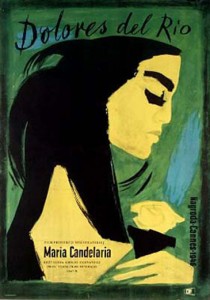 La segunda sesión del ciclo Grandes figuras del cine mexicano nos trae la película María Candelaria. La proyección es hoy, como siempre en el Café Literario a las seis.
La segunda sesión del ciclo Grandes figuras del cine mexicano nos trae la película María Candelaria. La proyección es hoy, como siempre en el Café Literario a las seis.
Una reportera le pregunta a un viejo artista sobre el retrato de una hermosa india desnuda del que nunca ha querido hablar. El artista le narra la historia de María Candelaria una joven indígena de Xochimilco que vivió a principios del siglo XX. La joven es rechazada por su propia gente debido a que es hija de una prostituta. El único que se atreve a estar con ella es Lorenzo Rafael un joven indígena que le profesa una profunda devoción. Pero el amor de los dos está a merced de los caprichosos juegos del destino.
The second session of the cinema series Great Figures of Mexican Cinema comes with the film María Candelaria. The screening is today at 6pm at Cafe Literario.
A young journalist presses an old artist (Alberto Galán) to show portrait of a naked indigenous woman that he has in his study. The body of the movie is a flashback to Xochimilco, Mexico, in 1909. The film is set right before the Mexican Revolution, and Xochimilco is an area with beautiful landscapes inhabited mostly by indigenous people.
Film screening | Cine: Macario
Estrenamos un nuevo ciclo de cine: Grandes figuras del cine mexicano.
El campesino Macario vive obsesionado por su pobreza y por la idea de la muerte. Obstinado, decide aguantarse el hambre hasta no encontrar un pavo que se pueda comer él solo. Su mujer roba uno y Macario sale al bosque a comérselo. Allí se niega a compartirlo con Dios y con el Diablo y sólo lo hace cuando se le aparece la Muerte. Agradecida, la Muerte entrega a Macario un agua curativa con la que el campesino comenzará a hacer milagros.
Hoy a las seis en el Café Literario.
We start today a new film series: Great Figures of Mexican Cinema
Poor, hungry peasant Macario longs for just one good meal on the Day of the Dead. After his wife cooks a turkey for him, he meets three apparitions, the Devil, God, and Death. Each asks him to share his turkey, but he refuses all except Death. In return, Death gives him a bottle of water which will heal any illness.
Today at 6m at Cafe Literario.
Cine | Film screening: Salve Melilla + La boda de Mawla
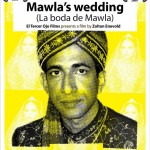 Hoy finaliza el ciclo de cine Los límites de la frontera en colaboración con PhotoIreland. Os ofrecemos dos documentales que no os podéis perder. En Salve Melilla, Carlos Rubiales se convierte, un año más, en el hombre de la Semana Santa. El presentador del programa religioso es el Cruz de guía que la televisión de Melilla pone en antena con motivo de la fiesta religiosa.
Hoy finaliza el ciclo de cine Los límites de la frontera en colaboración con PhotoIreland. Os ofrecemos dos documentales que no os podéis perder. En Salve Melilla, Carlos Rubiales se convierte, un año más, en el hombre de la Semana Santa. El presentador del programa religioso es el Cruz de guía que la televisión de Melilla pone en antena con motivo de la fiesta religiosa.
La boda de Mawla cuenta la historia de Mawla, que es de Bangladesh y vive en Madrid. Tiene trabajo y muchos amigos, pero su sueño es formar una familia. Después de siete años decide volver por primera vez a su país, con el fin de encontrar novia y casarse.
Te esperamos en el Café Literario hoy a las seis.
Today is the last session of the cinema series The limits of the frontiers in cooperation with PhotoIreland. Two documentaries will be shown today.
In Salve Melilla, Easter arrives at Mellilla. Carlos Rubiales becomes, another year, Easter man. He is the presenter of the religious programme Cruz de Guía (Guiding Cross) that Melilla’s Television broadcasts.
La boda de Mawla is about a young man from Bangladesh living inMadrid (Spain). He has a job and plenty of friends but his dream is to have a family. For the first time after seven years he decides to return to his country in search of a bride to get married.
We hope to see you today at 6pm at Café Literario.
Charla | Lecture: El mariachi: cultura popular mexicana, Patrimonio de la Humanidad
¿Quién no ha escuchado a un mariachi? Ya sea en en vivo, en disco, en la radio o en películas, indudablemente la música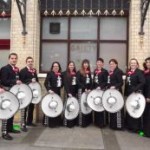 de mariachi es la más representativa de la música tradicional mexicana, e incuestionablemente parte fundamental de la cultura de México. No hay ninguna otra expresión musical mexicana más difundida en el mundo que la del mariachi.
de mariachi es la más representativa de la música tradicional mexicana, e incuestionablemente parte fundamental de la cultura de México. No hay ninguna otra expresión musical mexicana más difundida en el mundo que la del mariachi.
Originaria del estado de Jalisco, en el occidente de México, la música de mariachi fue distinguida en el 2011 por la UNESCO como patrimonio intangible de la humanidad. Conocedor del tema, el Secretario de Cultura del Gobierno de Jalisco, Jesús Alejandro Cravioto, ofrecerá un panorama sobre el significado del mariachi, compañero de vida de los mexicanos, ya que está siempre presente, desde el bautizo hasta el entierro, como lo describió recientemente en medios periodísticos. Te esperamos hoy en el Café Literario a las seis de la tarde.
Who has not heard a Mariachi? Whether live, on records, on the radio or in the movies, the Mariachi music undoubtedly is the most representative of traditional Mexican music, and unquestionably a fundamental part of the culture of Mexico. No other Mexican musical expression is more widespread in the world than the Mariachi music.
Born in the state of Jalisco, in Western Mexico, the Mariachi music was honored in 2011 by the UNESCO, the United Nations cultural organization, as intangible cultural heritage of mankind. Knowledgeable on the subject, the Secretary of Culture of the Government of the State of Jalisco, Jesus Alejandro Cravioto, will provide an overview of the meaning of the Mariachi, a life partner of Mexicans, “since it is always present, from the baptism to burial,” as he described it recently in the media. We hope to see you today at Café Literario at 6pm.
